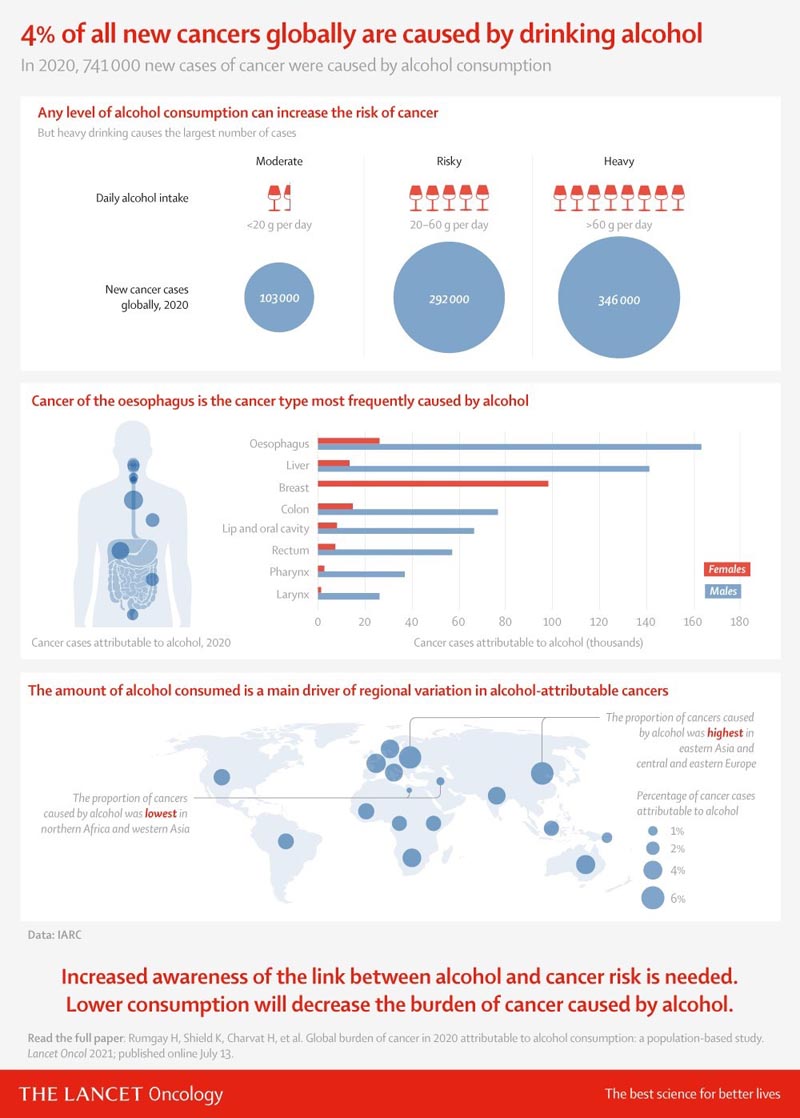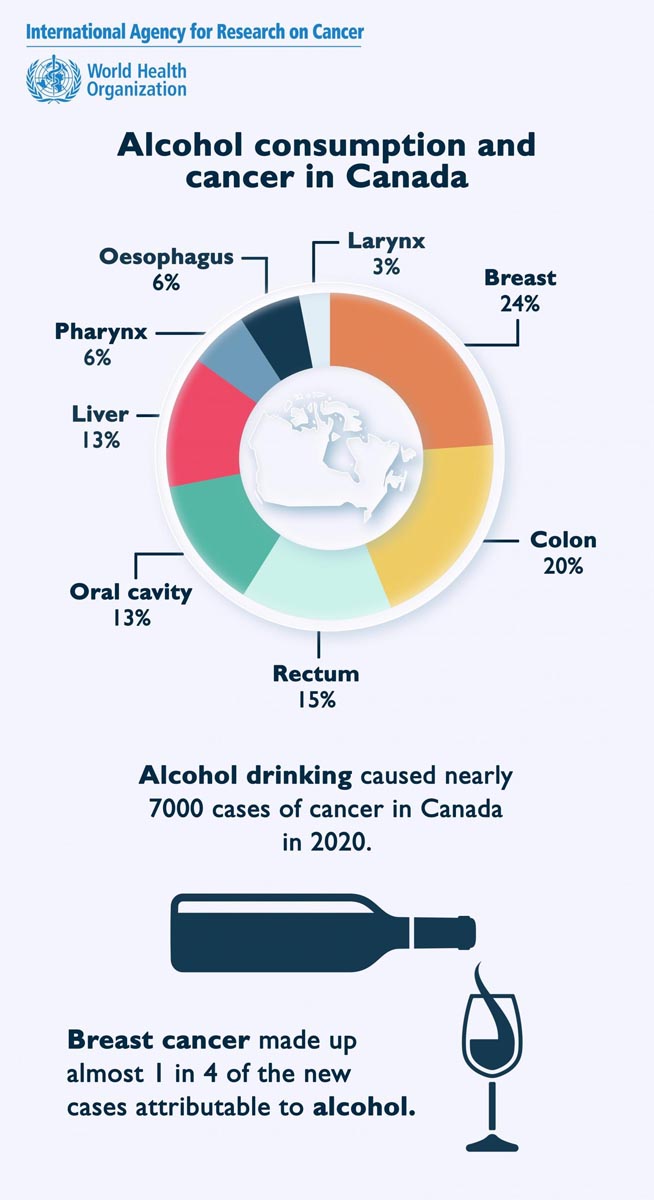Global burden of cancer in 2020 attributable to alcohol consumption: a population-based study Alcohol consumption is causally linked to multiple cancers. We present global, regional and national estimates of the alcohol-attributable cancer burden in 2020 to inform alcohol policy and cancer control in different settings globally. In this population-based study, population attributable fractions (PAFs) were calculated using a theoretical minimum risk exposure for lifetime abstention and 2010 alcohol consumption estimates from the Global Alcohol and Health Information System (assuming a period of 10-year latency between alcohol consumption and cancer diagnosis), combined with corresponding relative risk estimates from systematic literature reviews as part of the WCRF Continuous Update Project, were applied to GLOBOCAN cancer incidence data 2020 to estimate new cases of cancer attributable to alcohol. We also calculated the contribution of moderate (<20 g per day), risky (20-60 g per day), and heavy (>60 g per day) consumption to the total cancer burden attributable to alcohol, as well as the contribution of increased 10 g per day (up to a maximum of 150 g). The 95% uncertainty intervals (UI) were estimated using a Monte Carlo-like approach. Results Globally, an estimated 741,300 (95% IU 558,500–951,200), or 4·1% (3·1–5·3), of all new cancer cases in 2020 were attributable to alcohol consumption . Men accounted for 568,700 (76.7%; 95% UI 422,500-731,100) of the total alcohol-attributable cancer cases, and cancers of the esophagus (189,700 cases [110,900-274,600]), liver (154,700 cases [43,700-281,500]) and the breast (98,300 cases [68,200-130,500]) contributed to the majority of cases. PAFs were lowest in North Africa (0 3% [95% IU 0 1–3 3]) and Western Asia (0 7% [0 5–1 2]), and the highest high in East Asia (5·7% [3·6–7·9]) and Central and Eastern Europe (5·6% [4·6–6·6]). The greatest burden of alcohol-attributable cancers was represented by excessive alcohol consumption (346,400 [46.7%; 95% UI 227,900-489,400] cases) and hazardous drinking (291,800 [39.4%; 227,700-333,100] cases), while moderate consumption contributed to 103,100 (13.9%; 82,600-207,200) cases, and drinking up to 10 g per day contributed to 41,300 (35,400-145,800) cases. cases. Interpretation Our findings highlight the need for effective policies and interventions to increase awareness of cancer risks associated with alcohol consumption and reduce overall alcohol consumption to prevent the burden of alcohol-attributable cancers. |

Comments
A new study from the International Agency for Research on Cancer (IARC) of the World Health Organization (WHO), published in the journal Lancet Oncology , has found an association between alcohol and a substantially increased risk of several forms of cancer , including breast, colon and oral cancers. The increased risk was evident even among light to moderate drinkers (up to two drinks a day), who accounted for 1 in 7 of all new cancers in 2020 and more than 100,000 cases worldwide.
In Canada, alcohol consumption was linked to 7,000 new cancer cases in 2020, including 24% of breast cancer cases, 20% of colon cancers, 15% of rectal cancers and 13 % of oral and liver cancers.
"All alcohol consumption carries a risk ," said study co-author Dr. Jürgen Rehm, senior scientist at the Institute for Mental Health Policy Research and the Campbell Family Mental Health Research Institute at CAMH. "And with alcohol-related cancers, all levels of consumption are associated with some risk. For example, each standard-sized glass of wine per day is associated with a 6 percent higher risk of developing female breast cancer." .
"Alcohol consumption causes a substantial burden of cancer globally," said Dr. Isabelle Soerjomataram, deputy director of IARC’s cancer surveillance branch. "However, the impact on cancers is often unknown or overlooked, highlighting the need to implement effective policies and interventions to increase public awareness of the link between alcohol consumption and cancer risk, and reduce overall alcohol consumption to prevent the burden of alcohol-attributable cancers."
Dr Leslie Buckley, Head of Addictions at CAMH, added: "At our clinic we are seeing many people reporting an increase in alcohol consumption since the start of the pandemic. Although this may be related to temporary stressors, there is the potential for new habits to develop become more permanent The consequences of alcohol consumption are often subtle harms that initially take time to manifest, while long-term consequences such as cancer, liver disease, and alcohol use disorders of substances, can be devastating.
The modeling study was based on data on alcohol exposure from almost every country in the world, both surveys and sales figures, which were combined with the latest estimates of relative cancer risk based on consumption level.

Alcohol consumption caused almost 7,000 cases of cancer in Canada in 2020. Breast cancer accounted for almost 1 in 4 of new cases attributable to alcohol. Credit: International Agency for Research on Cancer (IARC) of the World Health Organization (WHO)
"Alcohol causes cancer in many ways," explained Dr. Kevin Shield, an independent scientist at the Mental Health Policy Research Institute and co-author of the study. The primary mechanism of how alcohol causes cancer is through impaired DNA repair. Other pathways include chronic alcohol consumption resulting in liver cirrhosis, and alcohol leading to dysregulation of sex hormones, leading to breast cancer. "Alcohol also increases the risk of head and neck cancer for smokers, as it increases the absorption of carcinogens from tobacco."
Dr. Rehm says research on the link between light to moderate alcohol consumption and cancer is relatively new and public policy does not yet reflect the degree of cancer risk. He added: "As an epidemiologist, I would recommend higher taxes to fully reflect the burden of disease from alcohol. In addition to limiting the physical availability and marketing of alcohol, price controls are recognized as cost-effective and high-impact measures to reduce consumption of alcohol. - related harm".
Governments may also consider requiring manufacturers to include information about the health and safety risks associated with alcohol consumption, including the risk of cancer, on alcoholic beverage labels.
These suggestions and many others can be found in the CAMH Alcohol Policy Framework. Updated in September 2019, the document proposes evidence-based measures to effectively address the health and social harms associated with alcohol.
















